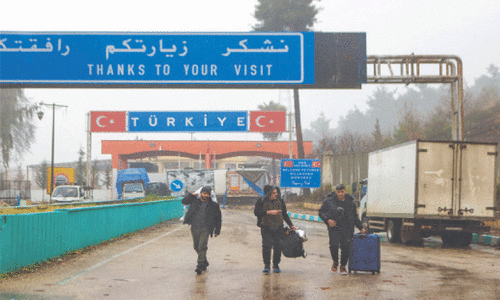TOKYO: Japan’s Prime Minister Yasuo Fukuda favours a softer approach to North Korea, and a possible US decision to take Pyongyang off a terrorism blacklist in exchange for nuclear disarmament could help him shift policy gears.
North Korea agreed in February to disable its main nuclear complex and declare all its nuclear activities in exchange for diplomatic incentives, including removal from a US list of state sponsors of terrorism.
Getting off that list is a big step towards obtaining badly needed funds from outside sources, including the World Bank.
But Tokyo has been pressing Washington not to make the move, which experts say could come as early as January, because it wants to use the blacklist as leverage to force Pyongyang to come clean over its abductions of Japanese citizens in the 1970s and 1980s to help train spies in Japan’s culture and language.
“We will be in trouble if the United States drops North Korea from the list of state sponsors of terrorism swiftly,” Foreign Minister Masahiko Komura said this week on television.
The fate of the abductees is an emotive topic for many Japanese, and insisting on bringing survivors home or at least clarifying their fate was central to the agenda of former Prime Minister Shinzo Abe, who resigned abruptly in September.
But if Washington took Pyongyang off its blacklist that could provide the diplomatic cover for Fukuda to make a politically unpopular decision to alter Japan’s long-standing policy on the abductees, or be left in isolation as North Korea opens up to aid and investment.
“Fukuda wants to escape from international isolation,” said Keio University Korea expert Masao Okonogi. “He hasn’t been able to yet, but if Washington takes the North off the list, he could use that diplomatic pressure.”
Pyongyang has admitted that its agents kidnapped 13 Japanese in the 1970s and 1980s, five of whom have since been repatriated.
North Korea says the other eight are dead, but Tokyo wants Pyongyang to provide more information about their fate, as well as a handful of others it says were kidnapped, and to return any survivors.
Japan has refused to normalise diplomatic ties with the North until the dispute over the abductees is resolved to its satisfaction. North Korea has said the case is closed.
Tokyo has also declined to provide energy aid to Pyongyang as part of the six-party nuclear deal between the two Koreas, China, Japan, Russia and the United States.
Removal of Pyongyang from the terrorism blacklist would at any rate make Japan’s hardline stance ineffective, analysts said.
“The harder Japan’s policy on North Korea becomes, the deeper Japan’s isolation could be in the six-party talks,” said Hideshi Takesada, a Korea expert at the National Institute for Defence Studies, a defence ministry-backed think-tank.
“Japan has already been isolated to a considerable extent.”
“If the United States removed North Korea from the list, the sanctions Japan imposed on North Korea would be toothless because the North will have access to funds abroad,” said Tadae Takubo, a professor of international politics at Kyorin University in Tokyo.
The sanctions, along with other punitive measures including a ban on all imports from North Korea, were slapped on Pyongyang after it conducted its first nuclear test in October 2006.
Some pundits have speculated that Fukuda, who held the key post of chief cabinet secretary when then-Prime Minister Junichiro Koizumi made a landmark visit to Pyongyang in 2002, could make a trip to the North in search of a breakthrough.
“Prime Minister Fukuda could go to Pyongyang to try to resolve the abduction issue, possibly in February or March,” said Yasuhiko Yoshida, a professor of international politics at the Osaka University of Economics and Law. “Then he would be able to score points ahead of a snap election.”—Reuters















































Dear visitor, the comments section is undergoing an overhaul and will return soon.